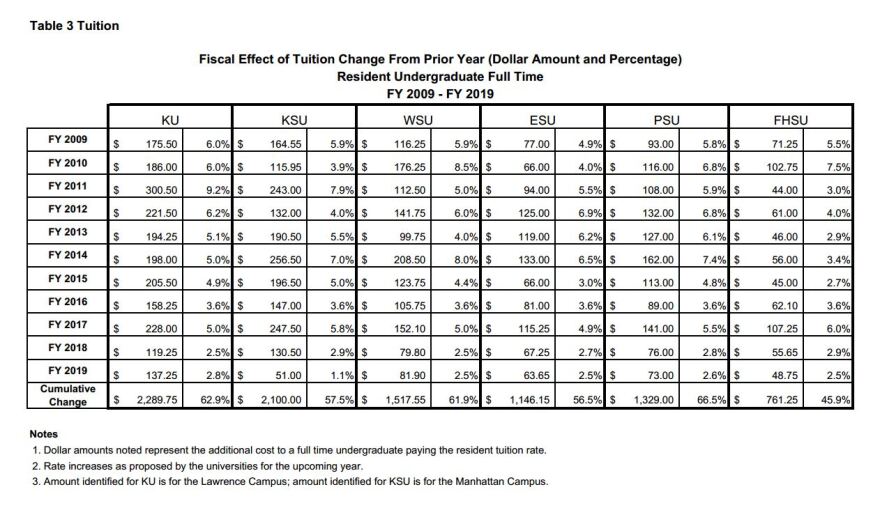Public universities in Kansas are proposing tuition hikes significantly lower than some of the larger increases seen in recent years. The schools presented the plans to the Kansas Board of Regents this week.
The increases in tuition and fees for in-state, undergraduate students range from 1.2 percent at Kansas State University to 3 percent at the University of Kansas.
Those numbers are smaller than some past increases. Over the last decade, annual tuition hikes have sometimes run as high as 9 percent.
“In recent years, the universities sustained reductions to their State General Fund appropriations,” a summary from the Board of Regents said. “Tuition increases, although not intended to make up for those reductions, have clearly served to mitigate the financial dilemma created by the budget cuts.”
Higher education in Kansas had to absorb a $30 million cut in 2016 put in place by then-Gov. Sam Brownback to help balance the state budget.
Lawmakers changed course on taxes last year by reversing many of the state’s 2012 tax cuts. They’ve also been restoring some of the higher education spending reductions.
After adding $15 million in higher education funding this year, lawmakers have now restored around $24 million of the $30 million cut.
In its explanation to the board, K-State said the funding increases over the last two years helped limit the tuition hike.
“This is the smallest tuition increase the university has requested since before 1989,” the explanation for K-State said.
If the increases are approved, the cost of in-state tuition and fees for a 15-credit-hour semester would range from $5,573.95 at KU and $5,191.50 at K-State down to $3,379.08 at Emporia State University.
The tuition increase at KU is slightly more than requested last year, even with the increase in state funding. KU spokeswoman Erinn Barcomb-Peterson said the increase is necessary to keep up with rising costs for employee health care and facilities.
“The proposed rate hikes won’t even cover all of that,” she said. “What we’re really looking at is a rapid increase in fixed costs.”
KU’s proposal does not include raises for workers.
Barcomb-Peterson said part of the facility cost is bringing online a new science building that will offer additional educational and research opportunities.
“It’s always about balancing affordability and quality,” Barcomb-Peterson said. “We want a KU education to be affordable for our students and families, but we also need to provide the level of education that people are going to expect from a research university like KU.”
In its summary, the Board of Regents said even after the funding boost, total state support will be $72 million below where it was in 2009.



Stephen Koranda is Statehouse reporter for Kansas Public Radio, a partner in the Kansas News Service. Follow him on Twitter @kprkoranda. Kansas News Service stories and photos may be republished at no cost with proper attribution and a link back to the original post.


